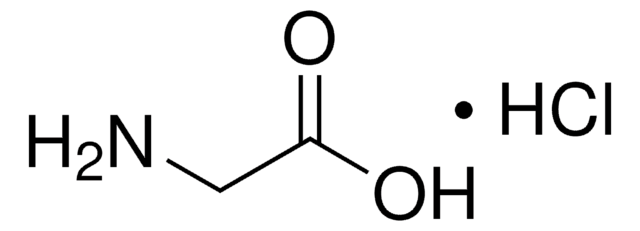55097
Glycine hydrochloride solution
100 mM amino acid in 0.1 M HCl, analytical standard
Sign Into View Organizational & Contract Pricing
All Photos(1)
About This Item
Empirical Formula (Hill Notation):
C2H5NO2 · HCl
CAS Number:
Molecular Weight:
111.53
Beilstein:
3909617
MDL number:
UNSPSC Code:
85151701
eCl@ss:
32160406
PubChem Substance ID:
NACRES:
NA.24
Recommended Products
grade
analytical standard
Quality Level
Assay
≥99.5%
form
liquid
analyte chemical class(es)
amino acids, peptides, proteins
concentration
100 mM amino acid in 0.1 M HCl
technique(s)
HPLC: suitable
gas chromatography (GC): suitable
color
colorless
application(s)
food and beverages
format
single component solution
storage temp.
2-8°C
SMILES string
Cl.NCC(O)=O
InChI
1S/C2H5NO2.ClH/c3-1-2(4)5;/h1,3H2,(H,4,5);1H
InChI key
IVLXQGJVBGMLRR-UHFFFAOYSA-N
Application
Glycine hydrochloride in combination with 1-allyl-3-methylimidazolium chloride can find applications as an ionic liquid solvent, which can be used to dissolve chitosan and also fabricate chitosan/cellulose blend films with definite proportions of chitosan. It can also be used to treat the condition of achlorhydria.
Refer to the product′s Certificate of Analysis for more information on a suitable instrument technique. Contact Technical Service for further support.
Signal Word
Warning
Hazard Statements
Precautionary Statements
Hazard Classifications
Eye Irrit. 2 - Met. Corr. 1 - Skin Irrit. 2
Storage Class Code
8B - Non-combustible corrosive hazardous materials
WGK
WGK 1
Flash Point(F)
Not applicable
Flash Point(C)
Not applicable
Choose from one of the most recent versions:
Already Own This Product?
Find documentation for the products that you have recently purchased in the Document Library.
Jr, M.J.J.
Encyclopedia of Chemical Processing and Design (1977)
Antibacterial blend films of cellulose and chitosan prepared from binary ionic liquid system
Fu R, et al.
Fibers and Polymers, 18, 852-858 (2017)
Emilie Macé et al.
Molecular therapy : the journal of the American Society of Gene Therapy, 23(1), 7-16 (2014-08-07)
Most inherited retinal dystrophies display progressive photoreceptor cell degeneration leading to severe visual impairment. Optogenetic reactivation of retinal neurons mediated by adeno-associated virus (AAV) gene therapy has the potential to restore vision regardless of patient-specific mutations. The challenge for clinical
Kasper B Hansen et al.
Molecular pharmacology, 84(1), 114-127 (2013-04-30)
N-methyl-d-aspartate (NMDA) receptors are ligand-gated ion channels assembled from GluN1 and GluN2 subunits. We used a series of N-hydroxypyrazole-5-glycine (NHP5G) partial agonists at the GluN2 glutamate binding site as tools to study activation of GluN1/GluN2A and GluN1/GluN2D NMDA receptor subtypes.
Zaki Shaikhibrahim et al.
International journal of cancer, 135(1), 19-26 (2014-01-01)
The mediator complex is an evolutionary conserved key regulator of transcription of protein-coding genes and an integrative hub for diverse signaling pathways. In this study, we investigated whether the mediator subunit MED15 is implicated in castration-resistant prostate cancer (CRPC). MED15
Our team of scientists has experience in all areas of research including Life Science, Material Science, Chemical Synthesis, Chromatography, Analytical and many others.
Contact Technical Service



